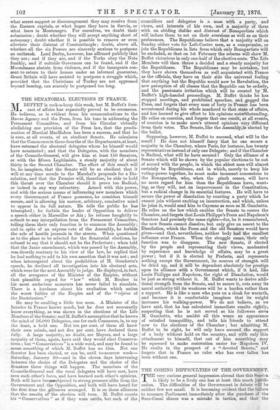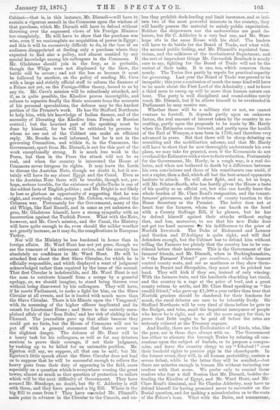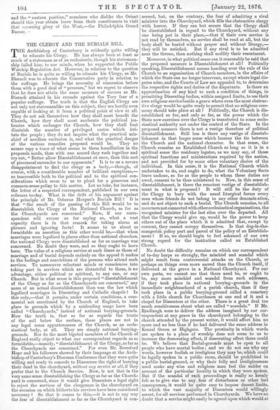THE COMING DIFFICULTIES OF THE GOVERNMENT.
TAE very curious general impression abroad that this Session is likely to be a lively one has at least this much justifi- cation. The difficulties of the Government in debate will be neither few nor small. It is becoming evident that the failure to summon Parliament immediately after the purchase of the Suez-Canal shares was a mistake in tactics, and that the Cabinet—that is, in this instance, Mr. Disraeli—will have to sustain a vigorous assault in the Commons upon the wisdom of that purchase, which Mr. Disraeli will have to defend without throwing over the expressed views of his Foreign Minister too completely. He will have to show that the purchase was wise, even if we contemplate no acquisition of power in Egypt ; and this it will be excessively difficult to do, in the face of an audience disappointed at finding only a purchase where they expected to find also a policy, and almost unaided by any special knowledge among his colleagues in the Commons. If Mr. Gladstone should join in the fray, as is probable, though the Whigs were not displeased by the blow, the battle will be severe • and not the less so because it must be followed by another, on the policy of sending Mr. Cave with a large and strictly official staff to reform the finances of a Prince not yet, on the Foreign-Office theory, bound to us by any tie. Mr. Cave's mission will be relentlessly attacked, and if, as is quite possible, the Khedive proves incorrigible, and refuses to separate finally the State accounts from the accounts of his personal speculations, the defence may be the hardest portion of the Premier's work. He has Sir Stafford Northcote to help him, with his knowledge of Indian finance, and of the necessity of liberating the Khedive from French or Russian control ; but the heaviest part of the speaking must be done by himself, for he will be criticised by persons to whom no one out of the Cabinet can make an efficient reply. Mr. Bourke is well informed, but he is not in the governing Committee, and within it, in the Commons, the Government, apart from Mr. Disraeli, is not for this part of the work exceptionally strong. It is much less weak in the Peers, but then in the Peers the attack will not be so real, and when the country is interested the House of Commons never foregoes its rights. It may. leave the Lords to discuss the Austrian Note, though we doubt it, but it cer- tainly will have its say about Egypt and the. Canal. Even as to the Austrian Note. there will be trouble, though not, per- haps, serious-trouble, for the existence of philo-Turks is one of the oddest facts of English politics ; and Mr. Bright is not likely to lose so glorious an opportunity of suggesting that he was . right, and everybody else, except Mr. Cobden, wrong, about the Crimean war. Fortunately for the Government, many of the old Whiga, like Earl Russell, and in some as yet unknown de- gree, Mr. Gladstone himself, have a strong sympathy with an insurrection against the Turkish Power. What with the Note, however, and Mr. Cave's mission, and .the Canal, the Ministry will have quite enough to do, even should the milder weather not greatly increase, as it may do, the complications in European Turkey.
Nor will the Ministry be less burdened in home than in foreign affairs. Mr. Ward Hunt has not yet gone, though we see the rumours of his retirement revive, and the country has absolutely no confidence in Mr.- Ward Hunt. He will be attacked first about the first Slave Circular, for which he is officially responsible, and which displayed a want of judgment acknowledged rather than repaired by the issue of the second. That first Circular is indefensible, and Mr. Ward Hunt is not the man to extricate himself from a scrape by a' graceful apology, or, we should imagine, to stand being thrown over without being disavowed by his colleagues. They will have, if he meets Parliament, to make a fight for him, on the Slave Circular at all events, and he is loaded with much more than the Slave Circular. There is his Minute upon the ' Vanguard,' with its screening of the higher officers implicated and its smash for Lieutenant Evans ; and there is the entirely unex- plained affair of the 'Iron Duke,' and her risk of sinking in the Channel. The journalists gave up that affair because they could get no facts, but the House of Commons will not be put off with a general statement that there never was the slightest danger. The defence of Mr. Hunt will be a heavy task for his colleagues, as well as for any debaters anxious to prove their courage, if not their judgment, by rushing up to be killed for an untenable position. Mr. Egerton will say, we suppose, all that can be said; but Mr. Egerton's little speech about -the Slave Circular does not lead us to suppose that he will be successful enough to relieve the heavy guns from their duty of appearing in the field, more especially on a question which is everywhere rousing the great towns, almost as much as that question of protection to sailors which will be the next difficulty of Government. They have secured Mr. Stanhope, no doubt, but Sir C. Adderley is still with them, and they have promised a big Bill. Where is the big Bill to come from They have conceded Mr. Plimsoll's main point in advance in the Circular to the Consuls, and un- less they prohibit deck-loading and limit insurance, and so irri- tate two of the most powerful interests in the country, they will hardly possess the material to satisfy public expectation. Neither the shipowners nor the underwriters are good de- baters, but Sir C. Adderley is a very bad one, and Mr. Stan- hope sits in the same House with his chief. The leaders will have to do battle for the Board of Trade, and what with the aroused public feeling, and Mr. Plimsoll's regulated fana- ticism, and the sulkiness of the incriminated Department, and the sort of imprudent things Mr. Cavendish Bentinck is nearly sure to say, fighting for the Board of Trade will not be the easiest of their tasks. It is one, too, which concerns them' nearly. The Tories live partly by repute for practical capacity for governing. Last year the Board of Trade was proved to be incapable • this year a confession of much the same kind will have to be made about the First Lord of the Admiralty ; and to have a third mess to sweep up will be more than human nature can bear. The party is well disciplined and round-roBins rarely reach Mr. Disraeli, but if he allows himself to be overloaded in Parliament he may receive one.
Whether there will be a military riot or not, we cannot venture to foretell. It depends partly upon an unknown factor, the real amount of interest taken by the country in re- cruiting, partly upon the proposals to be made by Mr. Hardy when the Estimates come forward, and partly upon the health of the Earl of Wemyss, a man born in 1796, and therefore very advanced in years. But that there will be sharp debating on recruiting and the mobilisation scheme, and that Mr. Hardy will have to show that he now thoroughly understands his own plans, we may take for granted, even if the Economists do not overhaul the Estimates with a view to their reduction. Fortunately for the Government, Mr. Hardy, in a rough way, is a real de- bater, and when not bothered to death by a difference between his own convictions and those of his constituents can wield, if not a rapier, then a flail, which all but the best-armed opponents hesitate to attack. He will show fight, and so, let us hope, will Mr. Sclater-Booth, who has hardly given the House a taste of his quality as an official yet, but who can hardly leave the whole burden of Mr. Clare Read's resignation, and the tenant- farmers' grievances, and the reform of county taxation to the Home Secretary or the Premier. The latter does not at heart fear the farmers, whom he can knock on the head with a County Suffrage Bill, if he pleases, but • he has to defend himself against their attacks without saying that, and has, moreover, to see that his new Duke does not get too hard measure iltir his indifference to the price of Norfolk live-stock. The Duke of Richmond and Lennox' and Gordon and D'Aubigny is quite right, and will find defenders enough, but the Cabinet has to defend him without telling the Farmers too plainly that the country has to be con- sidered before their interests. This is the Government of the farmers' friends, and Mr. Disraeli, when in Buckinghamshire, is " the Farmers' Friend " par excellence, and while farmers control county seats, and are as mutinous as they show them-. selves in Dorset and Shropshire, they must not be pricked too hard. They will kick if they are, instead of only wincing. With the farmers irate, and the landlords chuckling but timid,. and the country in a rage at the price of beef, and a great county reform to settle, and Mr.' Clare Read speaking as "the candid friend," who gave up £ 1,50 0 a year rather than bear that Norfolk graziers should be slandered for their fondness for muck, the rural debates are sure to be tolerably lively. Sir Stafford Northcote will be very tired of them before he gets to the Budget, and tries, amid the impatient annoyance of people who know he is right, and are all the more angry for that, to prove that Debt ought to be paid off before the rates are seriously relieved at the Treasury expense.
And finally, there are the Ecclesiastics of all kinds, who, like the poor, are in these days always with us. The Government has either to alienate the borough Tories by refusing all con- cessions upon the subject of burials, or to propose a compro- mise, and leave the country clergy to cry " Ichabodl" over their freehold rights to pasture pigs in the churchyards. In the former event, they will, in all human probability, sustain a severe defeat, while in the latter they will be assailed,—but there are miseries enough in human life without torturing our readers with that scene. We prefer only to remind those readers who fear a dull Session that Mr. Disraeli, besides de- fending the Khedive of Egypt, and Mr. Ward Hunt, and Mr. Clare Read's dismissal, and Sir Charles Adderley, may have to defend himself for having promised never to surrender on the Burial question, and for making a miscalculation as to the costs of the Prince's tour. What with the Daira, and nuzzuranas, and the " eastern position," members who dislike the Orient should this year obtain leave from their constituents to visit that crowning glory of the West, the Philadelphia Grand Bazaar. -




































 Previous page
Previous page